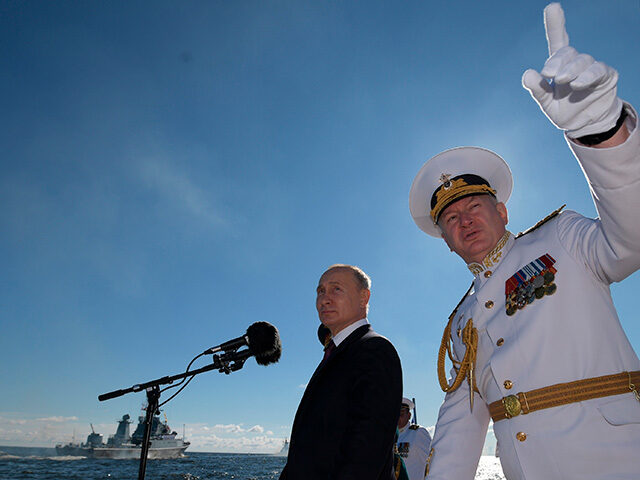Admiral Nikolay Yevmenov, the commander-in-chief of the Russian Navy, met with Chinese Defense Minister Li Shangfu on Monday during a visit to Beijing, the first such highest-level military visit of a Russian official to China since the head of the Wagner paramilitary group, Yevgeny Prigozhin, apparently attempted an armed mutiny in June.
Prigozhin, who had been leading the Wagner Private Military Company (PMC)’s efforts in Ukraine, published a dramatic video last week in which he claimed that Russian Defense Minister Sergei Shoigu was attempting to destroy his forces and bombed their location in Ukraine. The Wagner chief, who had for months complained that Moscow’s military leaders were corrupt and incompetent, said on the evening of June 23 that, in response, he would lead a “march of justice” out of Ukraine and into Moscow, alleging 25,000 mercenaries would join him to seize control of the Defense Ministry.
The episode, which prompted international alarm given Russia’s status as a nuclear-armed nation, lasted less than 24 hours, as the Russian government abruptly announced on June 24 that the communist dictator of Belarus, Alexander Lukashenko, had convinced Prigozhin to turn around before reaching Moscow in exchange for the government of Russian strongman Vladimir Putin dropping armed mutiny charges against him. Prigozhin is currently believed to be in Minsk, Belarus.
The government of Communist China, which has refused to vocally support or condemn the ongoing Russian invasion of Ukraine, expressed support for Putin throughout the Wagner affair via its Foreign Ministry. Commentary in China’s government-run media, however, indicated some discomfort in Beijing regarding the situation, predicting the aborted uprising would have “a negative impact” on the stability of the Russian military and leave the world wondering if Putin’s stranglehold on the country was “weakening.”
The Wagner affair did not appear in official government readouts and reports on Yevmenov’s meeting with Li on Monday. The Chinese Defense Ministry instead highlighted conversations on increasing the number and scope of joint maritime exercises and encouraging Russia to expand its presence in the “Asia-Pacific” region, where China maintains several illegal territorial claims.
“Gen. Li pointed out that under the strategic guidance of the two heads of state, the exchanges and cooperation between the two militaries have developed steadily,” the Chinese Defense Ministry relayed in a readout of their meeting. “It is believed that with the joint efforts of the two sides, the China-Russia mil-to-mil relations will continue to go deeper, achieve new progress, and rise to a new level.”
“It is hoped that the two sides will strengthen communication at all levels, organize joint exercises, patrols and competitions on a regular basis,” the readout continued, “expand practical cooperation in professional fields, and make positive contributions to regional and world peace and stability, Li added.”
Yevmenov reportedly agreed and offered “to expand exchanges between the two navies at all levels, jointly organize important exercises and training activities such as joint maritime exercises and joint patrols, and constantly push the relations between the two countries and two militaries to a new level.”
The Russian News Agency Tass, citing the Russian Defense Ministry, reported that Yevmenov expressed heightened Russian interest in increasing the country’s naval presence in the Asia-Pacific, a term typically used to mean the space between the Indian and Pacific Oceans, particularly the South China Sea.
Potential increased coordination with the Chinese military, particularly after the Wagner situation, would send a global message of trust in the Russian military. Prigozhin, in his multiple messages before and during the march to Moscow, repeatedly condemned Russian defense leaders for insufficiently training young recruits, pocketing money meant for necessary weaponry, and having no coherent plan to successfully end the Russian invasion of Ukraine.
In his first message following the news of the Lukashenko deal, Prigozhin condemned the Defense Ministry for not sufficiently protecting Russia itself, noting that he had marched thousands of soldiers into the strategically important southern city of Rostov-on-Don, then nearly marched into Moscow with little resistance.
“We showed a master-class on how February 24, 2022, had to look,” Prigozhin said, referring to the failed Russian conquest of Kyiv on the first day of the invasion, whose goal is to oust democratically elected Ukrainian President Volodymyr Zelensky. Prigozhin also lamented “serious security problems across the entire country,” referring to Russia.
Russian Defense Minister Shoigu, a frequent target of Prigozhin’s ire, organized a conference call with Russian military leaders on Monday in which he reportedly ensured them that the Russian military was organized, well-trained, and loyal to Putin.
“The provocation did not impact the operations of the groupings of forces. The personnel continued fulfilling their assigned objectives courageously and selflessly. I express my gratitude to the personnel for their faithful service,” Shoigu said, according to Tass.
Shoigu claimed that Prigozhin’s march to Moscow failed “first and foremost, because the personnel of the armed forces remained true to their oath and military duty.”
He also addressed Prigozhin’s complaints that the Russian forces were not sufficiently armed.
“Currently, planned deliveries of armaments, military and special hardware are underway simultaneously with the troop manning while the personnel are undergoing training and practicing unit cohesion,” he claimed.
The Chinese Foreign Ministry rejected calls to comment on the situation in Russia last week, describing it as an “internal affair.” The government-run newspaper China Daily gave a platform, however, to regime-friendly “experts” who lamented the Wagner uprising as a “very sobering incident” that hurt Russia’s credibility as a world power.
“The Wagner group’s coming into existence and growing into a strong force in Russia is something out of the ordinary,” one such expert said. “Maybe the incorporation of mercenaries into the Russian army was the best option for both the Russian government and the Wagner group, but it reminded of the Chinese saying about feeding a tiger and then inviting trouble.”

COMMENTS
Please let us know if you're having issues with commenting.